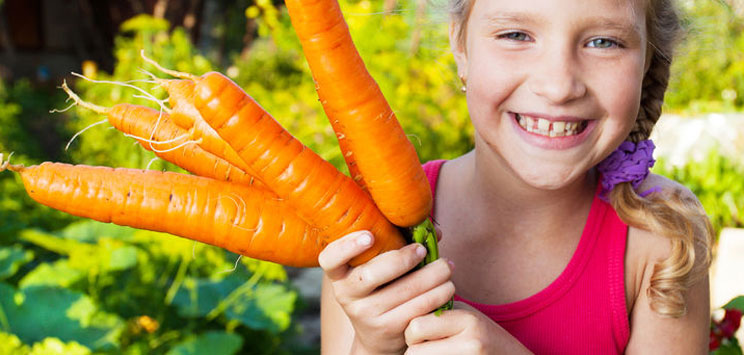
Teach Your Kids to Garden to Make Them Healthier
By
[ssba]
American families are on the go more than ever. From basketball practice to ballet lessons and piano class to auditions for the school play, moms and dads have nearly become chauffeurs for their kids due to busy schedules.
With all the hustle and bustle of everyday life, it’s easy to order takeout nearly every night for dinner. Meanwhile, the kids fill up on sugary juice boxes, chicken nuggets made from something that barely resembles chicken, and, if we’re lucky, a single plastic cup of applesauce with a popular cartoon character on the foil lid.
Many children grow up having no knowledge of where the food they eat comes from. Most have never seen a farm or even a garden.
If you think your child won’t touch fresh vegetables, you might be surprised what happens when you expose them to veggies that they’ve actually had the opportunity to plant, nurture, and harvest themselves.
That’s right: teach your kids to garden and you’ll likely see a budding interest in vegetables and perhaps even an increased awareness of their own health.
Container Gardens & Raised Beds
If you don’t have a lot of space to teach your child to garden, that’s OK. It’s actually incredibly easy to grow many kinds of vegetables in containers in your yard, on your patio, or even on your front porch.
Large flower pots or even plastic storage bins with the lids removed make great tools when it comes to your quest to teach your kids to garden.
Vegetables that thrive in containers include lettuce, tomatoes, peppers, zucchini, squash, and even root veggies like carrots and potatoes, if you use a container that is deep enough.
Containers also make great homes for strawberries, blueberries, and even peaches and apples, which have certain varieties available in dwarf trees that can be grown in nearly any space.
If you have a bit more space outside, raised garden beds are simple to make and upkeep and require less weeding than a traditional garden. You can also purchase raised garden beds from retailers online, or you can seek out your local private sales listings (such as Craigslist or Facebook yard sale pages) to see if you can find someone to build one for you.
Nearly any plant can be grown in a raised garden bed. The amount of space and soil depth required will vary based on plant. Some plants that do quite well in raised garden beds include tomatoes, lettuce, peppers, asparagus, onions, zucchini, squash, peas, and root vegetables.
Fruits such as smaller varieties of watermelon and pumpkin can also be grown in raised garden beds, and they are a favorite among those who teach their kids to garden. After all, most children love the sweet taste of watermelon and picking a fresh pumpkin come fall.
Focus on Quality, Not Quantity
Don’t worry about the size or yield of your efforts when you teach your kids to garden. Even planting just one or two tomato plants in a container on your porch can be enough to pique your child’s interest and teach them to enjoy healthy food.
Biting off more than you can chew could work in reverse, and instead teach your child that gardening and growing food is a hindrance and a chore rather than teaching them to enjoy it. Make sure you and your child can keep up with the needs of the garden so that this does not occur.
However, keeping your child involved in the garden is also critical. They must play a key role in every aspect of the garden in order to truly learn to appreciate the literal fruits of their efforts. From planting to weeding and watering to harvesting, children of all ages can help to grow their own food.
A Life Lesson
When you garden with your kids, you are providing them with invaluable lessons in life that they will carry with them into adulthood while giving them the opportunity to enjoy fresh vegetables and fruits that they themselves helped to cultivate.
When you teach your kids to garden, you teach them to work hard, nurture, and persevere for a desired end goal–something they’ll need to do many, many times throughout their lives.
In many ways, gardening promotes not only physical health in the form of exercise and the consumption of healthy food, but also mental health because it provides purpose, assists in goal setting, and is a true physical representation of the relationship between hard work and reward.









 newsletter no longer available
newsletter no longer available